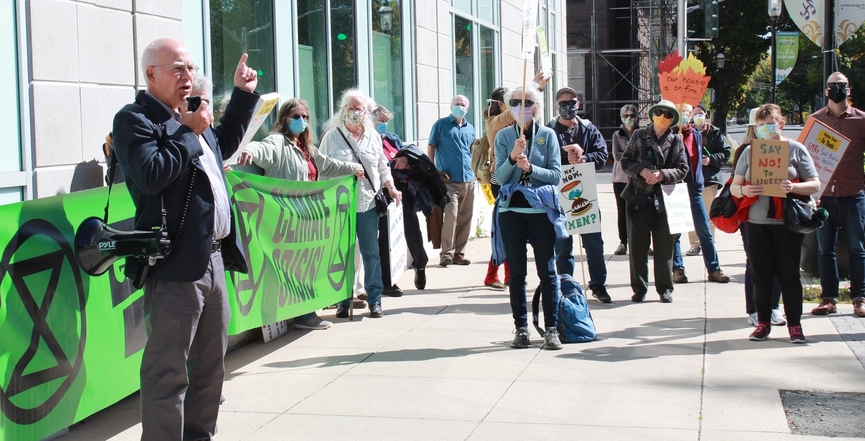Over the past year, anti-nuclear activists have watched industry lobbyists re-position nuclear energy as the solution to the climate crisis. Indeed, days before the throne speech, Natural Resources Minister Seamus O’Regan announced that nuclear power was necessary for Canada to meet its net-zero emissions target.
Given its legacy of toxic radioactive waste, nuclear energy would not be considered “clean technology” by most Canadians. However the nuclear industry has been working hard to scrub its image.
Making nuclear power “clean” was a goal of the December 2019 memorandum of understanding (MOU) signed by the premiers of New Brunswick, Ontario and Saskatchewan and more recently, Alberta, to develop the latest iteration of nuclear power, so-called “small modular nuclear reactors” or “SMRs.”
The MOU committed the parties to “work co-operatively to positively influence the federal government to provide a clear unambiguous statement that nuclear energy is a clean technology and is required as part of the climate change solution.”
The throne speech is evidence the parties have succeeded.
On September 23, the Trudeau government promised to “ensure Canada is the most competitive jurisdiction in the world for clean technology companies,” to move forward with a “Clean Power Fund,” to invest in “next-generation clean energy,” and to cut the tax rate in half for companies making zero-emissions products.
New Brunswick will be the first province to receive federal funding for new nuclear reactors. In a shadowy deal, the province and its public utility NB Power gave $5 million each to two nuclear energy companies from the U.S. and U.K. With the funds, the two established offices in Saint John and applied for federal funding.
The promise of federal funding for two new nuclear reactors was a campaign issue during the recent New Brunswick election. Both the Liberal and Progressive Conservative party leaders promoted themselves as the best steward for the proposed nuclear projects. The week before the September 14 election, Blaine Higgs told local media he had secured federal funding for the two companies and would make the announcement after the election.
Both companies plan to develop prototype nuclear reactors next to the existing NB Power Point Lepreau Nuclear Generating Station on the Bay of Fundy, the only operational nuclear power reactor outside of Ontario.
Both propose to use a risky process, reprocessing, to open up existing high-level radioactive waste from the Lepreau CANDU reactor, and to access the plutonium inside for new fuel for their prototype reactors. In a parallel development, legislation passed by the Trudeau government exempts the New Brunswick projects from environmental impact assessments.
Environmental activists in New Brunswick are monitoring the situation with concern. Since December, the independent NB Media Co-op has published a series of commentaries about the proposed reactors, arguing they threaten the transition to renewable energy, will create new forms of dangerous radioactive waste, could revive fears of a “plutonium economy,” are unlikely to be successful, and will produce energy that is more costly than renewable energy.
In May, the Coalition for Responsible Energy Development in New Brunswick (CRED-NB) was formed to oppose the proposed nuclear reactors and advocate for renewable energy. On September 25, the Global Day of Climate Action, CRED-NB member Extinction Rebellion New Brunswick organized a rally at the Fredericton office of the premier to call for a transition to renewable energy and oppose nuclear energy development in the province.
Speakers included David Coon, leader of the New Brunswick Green party and MLA for Fredericton South.
National opposition to the federal focus on nuclear energy is building. This week, Greenpeace Canada stated that including nuclear reactors in the throne speech shows that minister O’Regan and the Trudeau government “are suffering from nuclear amnesia.”
The Sierra Club Canada Foundation started a letter-writing campaign to minister O’Regan: “Take Action, new nuclear is not part of a path to net-zero.”
David Suzuki made headlines with his reaction to O’Regan’s endorsement of nuclear power: “I want to puke.”
How the environmental movement coalesces national opposition to the federal government’s embrace of the nuclear industry will be interesting to watch in the months ahead.
Susan O’Donnell is a researcher, writer and activist based in Fredericton.
Image: Joan Green



